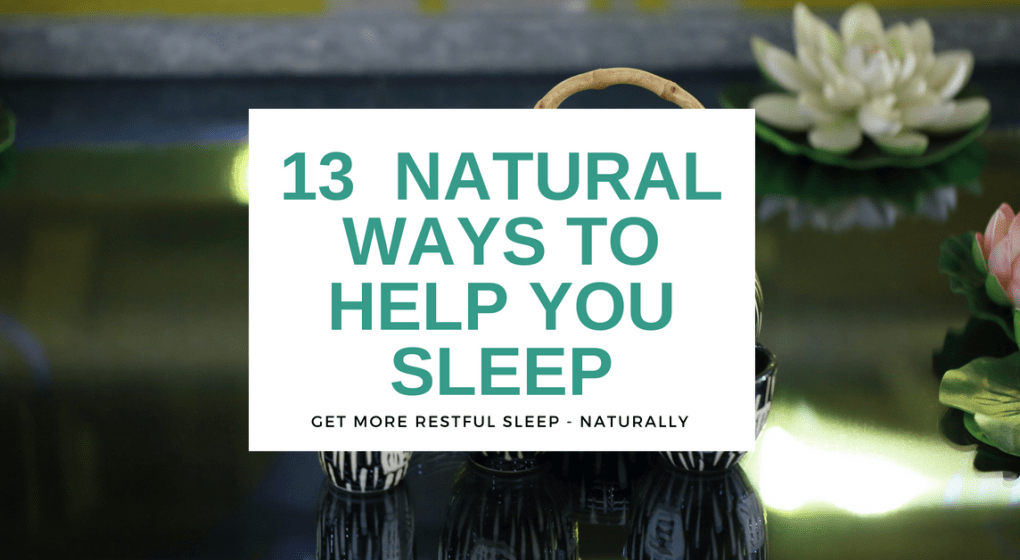How to Get to Sleep Faster…Naturally

March 24, 2020 | By Mark Hansen
Over the last decade, there has been an abundance of new research within the realm of sleep. While we have certainly known for a very long time that sleep is incredibly important (if we don’t get enough sleep we literally start to fall apart), we didn’t really know why it was so important.
Fortunately for us, with this recent research has come a lot more clarity around what sleep truly is, why as humans we need it so badly. And as a positive, this has also come with the knowledge on how we can go about improving it.
What is Sleep?
So, first and foremost, sleep has recently been defined as ‘a natural, normal, and reversible state of reduced responsiveness and inactivity, that comes in conjunction with an associated loss of consciousness.
As most of us would be fully aware, sleep tends to occur at regular intervals (for example, every night). With this, your body has an extremely consistent need for sleep, and as a result, any loss or delay in normal sleep can result in the need to ‘catch up’, with additional sleep. [1]
If we break down sleep into a little more detail, we can actually distinguish between two distinct types of sleep, known as ‘non-rapid-eye-movement’ (NREM) sleep, and ‘rapid-eye-movement’ (REM) sleep.
Rapid Eye Movement (REM) Sleep
REM sleep is characterized by a higher frequency brain activity leads to associated contractions of the muscles found within the eyes, causing the eyes to move around in a rapid manner – hence the name rapid eye movement sleep.
People typically enter REM sleep within the first 90 minutes of physically falling asleep. It is important to note, that as the sleep cycle does repeat itself throughout the night, you will enter a state of REM sleep 4-5 times throughout the night.
Most dreams occur during REM sleep, and it is thought to play a role in learning, memory, and mood. With this, REM sleep is thought to account for approximately 20 percent of an adult’s sleep cycle, and around 50 percent of a child’s or infant’s.
Non-Rapid Eye Movement (NREM) Sleep
Now, compared to REM sleep, most of your night is going to be spent in a state of NREM sleep – which can actually be separated into four distinct stages of sleep (stage N1, N2, N3, and N4). [2]
Stage N1 is the lightest stage of sleep. This stage typically lasts around 5 to 10 minutes, during which your heart rate begins to slow, and your muscles begin to relax. You are easiest to wake in stage N1. [15]
Stage N2 sleep is identified in by a rather significant changes in your brain waves. During a typical sleep cycle, N2 sleep can last up to 25 minutes, during which eye movement almost stops completely, and heart rate slows further. You typically spend the bulk of your night in N2 sleep.
Stage N3 and N4 are hands down the deepest stages of sleep. These stages (which are often lumped together) are both characterized by the onset of very slow brain waves known as delta brain waves.
Stage N3 and N4 are often known collectively as “slow wave sleep” (SWS). During these deep stages of sleep, the body is thought to repair and regrow tissues, build bone and muscle, and strengthen the immune system.
It is important to note that all stages and types of sleep are extremely important, and the transition from one type and one stage to the next is associated with what most would consider ‘normal and healthy sleep’.
As such, alterations in this flow of sleep is often associated with sleep disorders and associated sleep dysfunction.
The Health Benefits of Sleep
As I’m sure you can imagine, sleep is incredibly important, and any prolonged alterations in sleep can wreak absolute havoc with the body. With this in mind, we have collated recent research outlining how important sleep truly is, and how it does impact the body.
Does Sleep Help with Weight Loss?
First and foremost, there has been some interesting research around sleep and weight management.
A lack of sleep has shown strong associations with an increased risk of overeating and obesity, while simply getting less than 6 hours of sleep per night (on average) has shown some extremely strong associations with an increased body mass index. [3]
nterestingly, poor sleep has also been shown to have a rather serious impact on appetite.
There are two key hormones that control appetite regulation in the human body – ghrelin and leptin.
In simplistic terms, leptin decreases appetite, while ghrelin increases in. Amazingly, sleep loss has been shown to cause a decrease in leptin secretion, combined with a subsequent increase in ghrelin secretion – causing rapid and severe increases in hunger and overeating throughout the day. [4]
Through these mechanisms, people who sleep less have also been shown to have difficulty losing weight, suggesting the extreme importance of sleep in weight loss scenarios.
Does Sleep Help with Mental Illness?
While the exact mechanism remains somewhat unclear, the vast majority of patients suffering from depression and anxiety also tend to suffer from severe sleep disturbances – most commonly a difficulty initiating and maintaining sleep. [5]
This suggests that improving sleep may provide one potential method of assisting in the treatment of these, at times, debilitating illnesses. Although it is important to note that improving sleep is likely to be a small step in the treatment process, and not a cure all.
Does Sleep Help Cognitive Function and Memory?
Throughout the day the brain and nervous system is constantly breaking down compounds for energy, while also producing chemical compounds known as neurotransmitters. During these metabolic processes, certain compounds are produced as byproducts, which can actually become toxic and inhibitory if they start to accumulate within these tissues. [6]
Amazingly, during sleep we experience an upregulation in waste removal from the brain and neural tissue, reducing toxicity and the associated side effects that come with these byproducts.
Now, with this in mind, sleep is integral for the maintenance of normal and effective cognitive function.
Moreover, sleep improves both cognitive function and memory in the short term – whereas a lack of sleep has been shown to inhibit cognitive function in a big way, including causing reductions in attention capabilities, language learning ability, cognitive reasoning, decision-making, learning, and long- and short-term memory capacity. [16]
Does Sleep Help Diabetes?
Type II diabetes is a disease typified by an inability to manage blood glucose levels. This is often the result of a reduction in the sensitivity to the hormone insulin, which leads to chronically elevated blood glucose levels and associated inflammation – all of which wreak absolute havoc with the health of the body.
Interestingly, short term sleep deprivation has been shown to result in both reduced insulin sensitivity (thus heightened insulin resistance) and impaired glucose tolerance. Additionally, long term sleep deprivation has been shown associations with an increased risk of developing Type II diabetes – most likely as a result of these two key mechanisms. [7]
As a result, improving and maintaining a high degree of sleep quality is likely to both stave off the development of diabetes, while also assisting in its treatment.
Does Sleep Help with Heart Disease?
Individuals who sleep less than 5 hours per night (on average) have been shown to have significantly heightened blood pressure levels compared to those individuals who have what we would deem ‘normal’ and ‘healthy’ sleep patterns.
With this increase in blood pressure also comes large increases in incidence of heart disease, suggesting a direct link between sleep quality, blood pressure, and risk of cardiovascular incidents and disease.
As such, improvements in sleep are likely to have a hugely positive impact on heart health and normal cardiovascular function.
Is Sleep Anti-Inflammatory?
Chronic inflammation throughout the body occurs in response to various types of stress, including physical, lifestyle, and even emotional. With this, it can also be driven by various lifestyle factors such as poor diet and low activity levels.
Interestingly, adequate sleep has been shown to assist in the reduction of inflammation throughout the entire body. [8]
On the flip side of this, sleep deprivation has been shown to cause the secretion of numerous pro-inflammatory cytokines (proteins that increase inflammation), resulting in huge increases in global inflammation throughout the entire body. [17]
Considering this, it is easy to state that sleep itself is anti-inflammatory in nature, offering one of the best remedies to staving off inflammatory diseases.
Does Sleep Help Boost the Immune System?
Building on the above point, inflammation has been shown to contribute to reduction in immune system’s capabilities, and an associated increase in risk of illness and infection. As a result, lack of sleep has been shown to cause an increase in bacterial, viral, and parasitic infections.
Alternatively, good quality sleep has been shown to cause large improvement in the immune systems ability to fight infections and stave off disease, providing a clear demonstration that increasing sleep quality is a surefire wat to boost immune system function. [9]
Does Sleep Impact Hormone Levels?
Poor sleep patterns have been shown to wreak havoc with the body’s hormonal system, causing hormone imbalances across a number of different areas.
Firstly, poor sleep quality has been shown to result in the increased secretion of thyroid hormones TSH, T3, and T4. Over time this can lead to a suppression in reproductive function and associated declines in metabolic and reproductive health. [10]
Secondly, poor sleep has also been shown to lead to a significant reduction in testosterone levels in males. This can lead to associated declines in energy levels, mental health, and metabolic health, combined with increases in weight gain. [11]
And finally, poor sleep has also been shown to cause imbalances in the hormone estrogen, which can lead to infertility issues in females.
So, in short, sleep helps optimize hormone levels – which can have a huge impact on health.
Is Sleep Anti-Cancer?
There is some interesting research demonstrating that people who suffer from poor sleep quality and sleep problems (such as difficulty falling asleep, restless or light sleep, or early awakening) have an increased risk of cancer. [12]
Alternatively, improved sleep quality has been suggested to reduce cancer risk by enhancing the secretion of the hormone Melatonin.
Melatonin is an amazing hormone that has been shown to assist stave off the development of cancer by limiting the growth of tumorous cells, acting as an anti-oxidant within the body, preventing cancerous cells from migrating to other areas of the body, and inducing normal cell differentiation. [13]
Does Sleep Help Digestive Health?
And finally, poor sleep has been shown to cause an increased incidence of inflammatory bowel disease (IBS), leaky gut, and Crohn’s disease, while also inhibiting normal bowel function. With this, poor sleep often comes with an increased incidence of diarrhea, constipation, bloating, abdominal cramping, and nausea. [14]
While the exact mechanism is not clear, it has been hypothesized that adequate sleep can decrease inflammation throughout the gut and digestive system, causing a subsequent increase in digestive health.
13 Natural Sleep Aids for Adults
Given that sleep is so extremely important for health and function on a daily basis, we wanted to give you some great options that you can implement if you want to improve your sleep completely naturally.
Magnesium
Magnesium is an essential mineral that plays numerous roles throughout the human body – some of which pertain to sleep.
You see, the consumption of magnesium has been shown to increase the activation of your parasympathetic nervous system, while simultaneously increasing the production of your primary sleep hormone melatonin – both of which can increase sleep quality in a very big way.
You can choose to increase magnesium in your diet eating magnesium-rich foods like almonds, spinach, peanuts, brown rice, or broccoli.
Additionally, you can also take a magnesium supplement before bedtime. Calm brand is a natural and very popular option, that is extremely effective. We should also note that supplementing with magnesium may result in some bowel issues (such as loose stool), so it is imperative that you follow the dosage directions and make sure you ease into it.
Start Using Earplugs
If you’re a light sleeper, you might wake up multiple times a night due to outside noise (or even your partner’s snoring).
With this in mind, earplugs offer a very simple method of blocking out loud noises, while still allowing you to hear things like your alarm, your spouse, or a smoke detector. Ear plugs come in a variety of styles and sizes, and it’s important to find a pair that works best for you and your individual ear shape.
Our favorite ear plugs are HEAROS Sleep Pretty.
St. John’s Wort
St. John’s Wort is a natural supplement derived from the Hypericum plant.
This amazing plant has been used or centuries to treat depression, insomnia and anxiety, hence its well-known reputation for enhancing both sleep quality and sleep duration in those individuals who suffer from poor sleep.
In modern day, there has been an abundance of research demonstrating the positive effects of supplements containing St. Johns Wort on measures of sleep quality. With this in mind, it offers a fantastic means of enhancing sleep easily and effectively.
Take Valerian Root
Valerian Root comes from a flowering plant known as Valeriana officinalis, which is found growing natively throughout regions of both Europe and Asia.
While its mechanism of action remains somewhat unclear, there is an abundance of research demonstrating that the supplementation of valerian root can improve your ability to fall asleep, while simultaneously improving sleep quality.
One of the best Valerian Root supplements on the market is NOW Valerian Root 500mg.
Try Passion Flower
Used throughout ancient Peruvian medical practices for the better part of a century, this interesting plant (scientifically known as Passiflora incarnata) has long been thought to improve symptoms related to anxiety, insomnia, epilepsy, and ADHD.
In conjunction with this, recent research has shown that the consumption of passion flower can also enhance sleep quality, increasing the amount of time spent in deep and ‘restorative’ sleep states (namely stage N3 and NR of NREM sleep).
A great passion flower supplement is Solaray Passion Flower Capsules.

Dr. Eric Wood, ND
The Naturopathic Doctor says…
“Also don’t forget two simple yet powerful tools to improve your sleep:
1) Taking an epsom salt or peat moss bath: the act of soaking in warm, mineral-rich water can help the body go into ‘parasympathetic dominance’, which is our ‘rest and digest mode’, many people struggle with due to overly busy schedules, not winding down before bed, etc. It also helps the body start to regulate it’s temperature for bedtime. Most individuals are unaware that our body temp needs to drop approximately 0.4 degrees celsius to sleep well. This can also be helped by…
2) Turning down the thermostat. Ever tried to sleep on a hot, sticky summer night? It doesn’t tend to work too well as your body is struggling to be able to cool and drop down that body temp, so you can reach deeper and more restful sleep.“
Explore Essential Oils
There are many different types of essential oils that can be used as natural sleep aids. Some popular essential oils include lavender, vetiver, Roman chamomile, ylang ylang, bergamot, sandalwood, marjoram, and cedarwood.
The use of essential oils has been shown to cause vast improvement in the ability to fall asleep, while also resulting in deeper and less restless night’s sleep.
It is important to note that different essential oils tend to have their own unique properties and may also react one way with one person but differently for another. As a result, finding the right essential oil for you might take a little trial and error, but once you find one that works, you’re bound to get a more restful night of sleep.
This great Essential Oil pack by Divine provides a great option.

Rehne Burge, CA, NAHA Louisiana Director
The Aromatherapist says…
“When purchasing essential oils, follow these simple steps:
1) Avoid purchasing oils from a department, drug or grocery store.
2) Purchase essential oils from online websites that provide online GC/MS analysis reports onsite.
3) Never take the advice of a salesperson or other unless they are trained in Aromatherapy.
To locate an Aromatherapist or ask further questions, you can find me or a Director in your area at the NAHA site.”
Try Tryptophan
Tryptophan is one of the many amino acids found in the protein rich foods we eat on a daily basis.
This interesting amino acid is converted into a molecule called 5-HTP (or 5-hydroxytryptophan, for those nerds out there) in the human body, which is used to create both serotonin and melatonin – two key hormones that are known to increase sleepiness and sleep quality.
While quite a few foods contain tryptophan (including dark chocolate, oats, milk, eggs, red meat, fish, poultry, peanuts, almonds, and spirulina), there is evidence to suggest that when it comes to enhancing sleep, taking a high-quality tryptophan supplement may offer the best option.
One of the most effective Tryptophan supplements ion the market is Doctors Best L-Tryptophan 500mg.
Start to Take Melatonin
Melatonin is a natural hormone produced within the human body that plays a role in the regulation of normal sleep.
Interestingly, the production and secretion of Melatonin in the brain is dictated by the time of day, where it typically rises in the evening (thus promoting sleep) and decreases in the morning (thus promoting wakefulness).
Taking this into consideration, the supplementation of melatonin has been shown to cause significant improvements in the ability to fall asleep, while also showing associations with improved sleep quality over time.
A great Melatonin supplement is Nature Made Melatonin 3mg.

Laura Myers, RDN
The Nutritionist says…
“Drinking a glass of tart cherry juice has also been shown to help aid in sleep. Tart cherries are a natural source of melatonin, which helps to regulate your sleep cycles. In addition, tart cherry juice has been shown to increase to availability of tryptophan–a precursor to serotonin (as discussed in this article). Tart cherry juice can be found at most grocery stores in the juice aisle.”
Decrease Your Screen Time
The blue light produced by electronic screens like TVs and iPhones has been shown to disrupt your circadian rhythms, block melatonin secretion, and seriously interfere with sleep duration and quality, therefore causing sleep disturbances.
Trying to limit screen time for an hour or two before bed is a fantastic way to cause subsequent improvements in sleep.
Alternatively, you can also purchase glasses that physically block the blue light emitted from screens, making sure that they do not interfere with your body. The technology within these glasses has come in leaps and bounds over the last 10 years, in which they now look quite nice and are also comfortable to wear to boot.
Our favorite light blocking glasses are Gunnar Optiks PPK Unisex Glasses.
Increase Your Calcium Intake
Calcium is an essential mineral found within the body that helps form bones and teeth. Within this, it is also essential for nerve, enzyme, heart, muscle and blood-clotting functions. In conjunction with this, this amazing mineral also contains tryptophan – which as we know, is a key amino acid that can enhance sleep.
As a result of this interaction, the supplementation of calcium has been shown to improve sleep quality in a big way.
A fantastic calcium supplement is this great option by Solaray.

Dr. Ahmad Alsayes, MD
The Medical Doctor says…
“Chamomile is one of the most ancient medicinal herbs we know, and when we drink its aqueous extract (in form of tea) regularly, it can effectively work as a mild sedative to calm nerves and reduce anxiety and to treat nightmares, insomnia and other sleep problems.“
Drink Chamomile Tea
Chamomile tea has long been used as a completely natural sleep aid – and fortunately for us, recent research has shown that its use is completely warranted.
You see, chamomile tea contains a potent antioxidant known as apigenin. Apigenin binds to specific receptors in your brain, which can decrease feelings of stress and anxiety, while simultaneously initiating the onset of sleep.
As a result, having a quiet chamomile tea before bed offers a fantastic natural method of improving sleep. Our favorite chamomile tea is this great quality option by Traditional Medicinals.
Exercise Regularly
And finally, exercise has also been shown to act as one of the most potent natural sleep aids on the planet!
Regular physical activity has been shown to increase the amount of deep sleep you are likely to receive on a nightly basis. As exercise causes your body to expend more energy, it can further enhance your ability to fall asleep, while also reducing feelings of stress and anxiety.
So, performing a little exercise after work might be just what you need to improve your sleep in a very big way.
Natural Sleep Aids for Children
Although the above options offer some fantastic sleep remedies for adults, they don’t all apply to children. This is because many of these compounds have limited research in children, and as such we do not actually know whether they are safe for children to use (or not).
As a result, we have compiled a list of completely safe and natural methods for helping your children fall asleep.
Regular Physical Activity
So, our first two points are pretty simple in premise (in which they really roll on from the above tips for adults quite nicely), but that doesn’t make them any less effective.
First up, getting your kids to perform some form of physical activity in the evenings or after school is a surefire way to improve their sleep quality in a very big way. As mentioned above, exercise causes fatigue and has been shown to increase feelings of tiredness in the evenings – resulting in markedly improved sleep over night.
Limit Screen Time Before Bed
As above, the blue light emitted from electronic devices can inhibit the secretion of melatonin while also stimulating mental activity, leading to a reduction in the ability to fall asleep. This has also been shown to cause a more restless sleep.
As a result, we strongly recommend that you turn of screens 2 hours before bedtime. Instead, use this time in the evenings to do something creative or practice reading – both of which have been shown to increase relaxation and enhance sleep quality.
Use Lavender Oil
Using essential oils derived from lavender in an aromatherapy setting has been shown to cause vast improvement in sleep quality. As such, using lavender oil in your children’s bedroom around bedtime offers the perfect method of safely helping them get a good night sleep.
Try Using Magnesium
Just like it is important in adults, magnesium is also extremely important in children. As a result, its supplementation has been shown to cause large improvements in sleep quality.
However, if you do choose to provide your children a magnesium supplement, it is imperative you choose one with the correct dosages. A safe and effective dosage for most children ages 2-8 years old is 100mg of magnesium per day (the recommended upper daily limit for older children is 350mg).
Our favorite kid friendly magnesium supplement is Nature’s Plus Animal Parade Magnesium for Kids.
Combine Melatonin and Chamomile
And finally, like adults, both chamomile and melatonin have been shown to have a very positive effect on sleep in children. Now, given that most children have a hard time drinking tea, supplements typically offer your best option – but you do need to be careful with dosage.
Often 0.5 to 1.0mg of melatonin is more than enough to stimulate improvement in sleep, while 2mg of chamomile extract also appears to be both safe and effective.
Our favorite kid friendly sleep supplement that ticks both of these boxes is OZzzz’s Fruit Flavored Sleep Aid for Children.
Natural Sleep Aids for Babies
And finally, we move into natural sleep aids for babies. Different to both adults and children, we firmly believe that it is in your best interest to steer clear of supplements with these guys and focus solely on getting together a solid sleep routine.
The following tips are what we believe to be the best way of enhancing the sleep quality of your infant safely and effectively.
Develop A Set Routine
Developing a bedtime routine for your infant child is a surefire way to enhance sleep quality and cause large improvements in their ability to fall asleep. This might include about 20 minutes of quiet and calm activities (such as bathing, reading a story, or singing a lullaby) before putting them to bed.
In theory, these sorts of bedtime rituals help your child wind down, making the transition from waking to sleeping easier – but the key is to make sure you do it consistently every single night.
Try an Infant Massage
There is some interesting research demonstrating that giving your child an infant massage before bed can actually improve relaxation, thus enhancing their ability to fall asleep. As a result, this could be the perfect addition to your normal bedtime routine, both enhancing the effectiveness of that routine, while also providing additional sleep benefits.
Use a Swaddle
Swaddling describes the act of wrapping your child in a cloth or blanket in a manner that restricts movement. This is meant to replicate the feeling of being within the womb and has been shown to enhance sleep quality in infants and newborns alike.
From a safety perspective, if you do choose to swaddle your baby it is important to note that the swaddle should be wrapped lightly – while we want to restrict movement, we do not want to restrict breathing.
Additionally, the child should always be placed on their back when swaddled, as this is hands down the safest sleeping position.
Provide Some Sunshine Throughout the Day
Exposing your child to direct sunlight during the day has been shown to aid in the development of an infant’s normal circadian rhythm. In doing so, it can actually improve their ability to fall asleep at night by enhancing their natural melatonin secretion.
So simply taking your infant out for a couple of hours in the sun each and every day may be just what you need to improve their ability to fall asleep and stay asleep!
Avoid Blue Light
And finally, just as it can with adults and kids, blue light can severely inhibit your baby’s ability to fall asleep – so next time you think of feeding them in front of the TV or computer near bedtime, think again.
Try and feed them somewhere different, where there are no screens around. This is a surefire way to ensure that they are not exposed to any blue light near their bedtime.
Conclusion
When it comes to health and function, sleep is absurdly important, in which it can impact nearly every single one of the body’s systems in some way, shape, or form. With this in mind, maximizing the quality and duration of your sleep – and that of your children – is imperative.
Using the tips and aids outlined in this article you can improve sleep in huge way, causing massive improvements in health in the process.
If you have had any experience using the tips and aids outlined in this article, then we would love to hear about it – so please drop us a comment and we will get back to you ASAP.

Article by
Mark HansenMark Hansen is a passionate sleep enthusiast and the founder of 40Winks.io, a popular blog dedicated to promoting healthy sleep habits and improving sleep quality. With years of experience in the healthcare industry, Mark has become an expert on the science behind sleep and its impact on overall health and wellness. He believes that everyone deserves a good night's sleep and works tirelessly to provide his readers with practical tips and advice for achieving optimal sleep. Mark's commitment to spreading awareness about the importance of sleep has earned him a loyal following and made 40Winks.io a go-to resource for anyone looking to improve their sleep quality.
